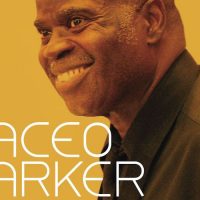A massive reissue project from Apple Records had me digging back through the old Billy Preston sides. None is more titanically funky, and lastingly influential, than “Outa-Space,” with its grease-fire groove and afro-shaking new clavinet sound.
“Outa-Space” is not to be confused with his similarly named No. 4 hit of a year later, “Space Race.” (Dick Clark would subsequently use this tune during the mid-show break for the remainder of American Bandstand’s run into the late 1980s.) Preston also had songs called “The Looner Tune,” “Sock It Rocket” and “Go Where No One’s Gone Before.”
For me, though, his first trip into the celestial remains his best. There is a direct line between the signature keyboard sound of “Outa-Space” and much of what came later in the use of synthesizers in black music, and specifically a growing subgenre of trippy wow-man funk.
Billy Preston’s appearances in support of the song also set the template for his own shag-carpet 1970s-era persona: There was, of course, his sky-high mushroom-cloud hair, which shivered and swayed as Preston played with this uninhibited, full-gospel abandon. Just below that shone a mile-wide, gap-toothed smile, so magnetically appealing that it threatened sometimes to obscure just how talented Preston was as a musician.
Issued initially as the B-side to “I Wrote a Simple Song,” Preston’s debut during a subsequent stay at A&M Records, “Outa-Space” arced like a moon shot to No. 2 on the pop charts once enterprising DJs began flipping the single. Preston crafted this way-out new sound on “Outa-Space” by running the clavinet through a wah-wah pedal, while calling out changes to his backing band during an improvised session. Later, he added organ and handclaps — because, you know, every dance number back then needed handclaps.
Originally signed by the Beatles on Apple, his long association with the band includes prominent work on the group’s swansong album Let It Be. He also appeared on solo projects by George Harrison, John Lennon and Ringo Starr, and had minor hits with his own versions of “Get Back” and “My Sweet Lord.”
Still, Billy Preston’s most important association (and influence) remained Ray Charles, who so brilliantly melded the twin African-American fountainhead musical styles of R&B and gospel.
Charles had first taken the younger keyboardist on a series of seminal tours around the time of Preston’s debut recordings, which included the humbly titled Most Exciting Organ Ever from 1965. A year later, Preston appeared on Charles’ Cryin’ Time LP, which featured the Top 40 hit “Let’s Go Get Stoned.” Something clicked. While on tour, Charles reportedly said: “Billy is the man I would like to carry on the work I started.”
When Apple folded, Preston then signed with A&M Records — where the former child star would finally rocket to a short-lived adult superstardom. Preston topped the pop charts in 1973 with “Will It Go Round in Circles,” and again in 1974 with “Nothing from Nothing.” His song “You Are So Beautiful” was a No. 1 hit for Joe Cocker in 1975, as well.
Preston, who used to call his working band the God Squad, pretty much stuck to the Charles template — issuing records that mixed both the rhythms and spirituals of his youth. A pair of Preston’s singles went to No. 11 on the R&B charts in 1974, “You’re So Unique” and “Struttin’,” before he made a final appearance in the pop Top 5 with 1979’s “With You I’m Born Again,” recorded with Syreeta Wright.
But Preston and producer Quincy Jones managed something completely different here, tightening the focus into a new synthesis. “Outa-Space” had a distinctly modern bounce, with an electrified riff that might never end — but for the confining width of an earth-bound disc.
Perfectly named, then, right?
Billy Preston, who fell ill five years ago today before passing the following summer at just 59, used “Outa-Space” to definitively step out from behind Charles’ lengthy shadows.
We’ve been dancing ever since.
- How Deep Cuts on ‘Music From Big Pink’ Underscore the Band’s Triumph - July 31, 2023
- How ‘Islands’ Signaled the Sad End of the Band’s Five-Man Edition - March 15, 2022
- The Band’s ‘Christmas Must Be Tonight’ Remains an Unjustly Overlooked Holiday Classic - December 25, 2016




